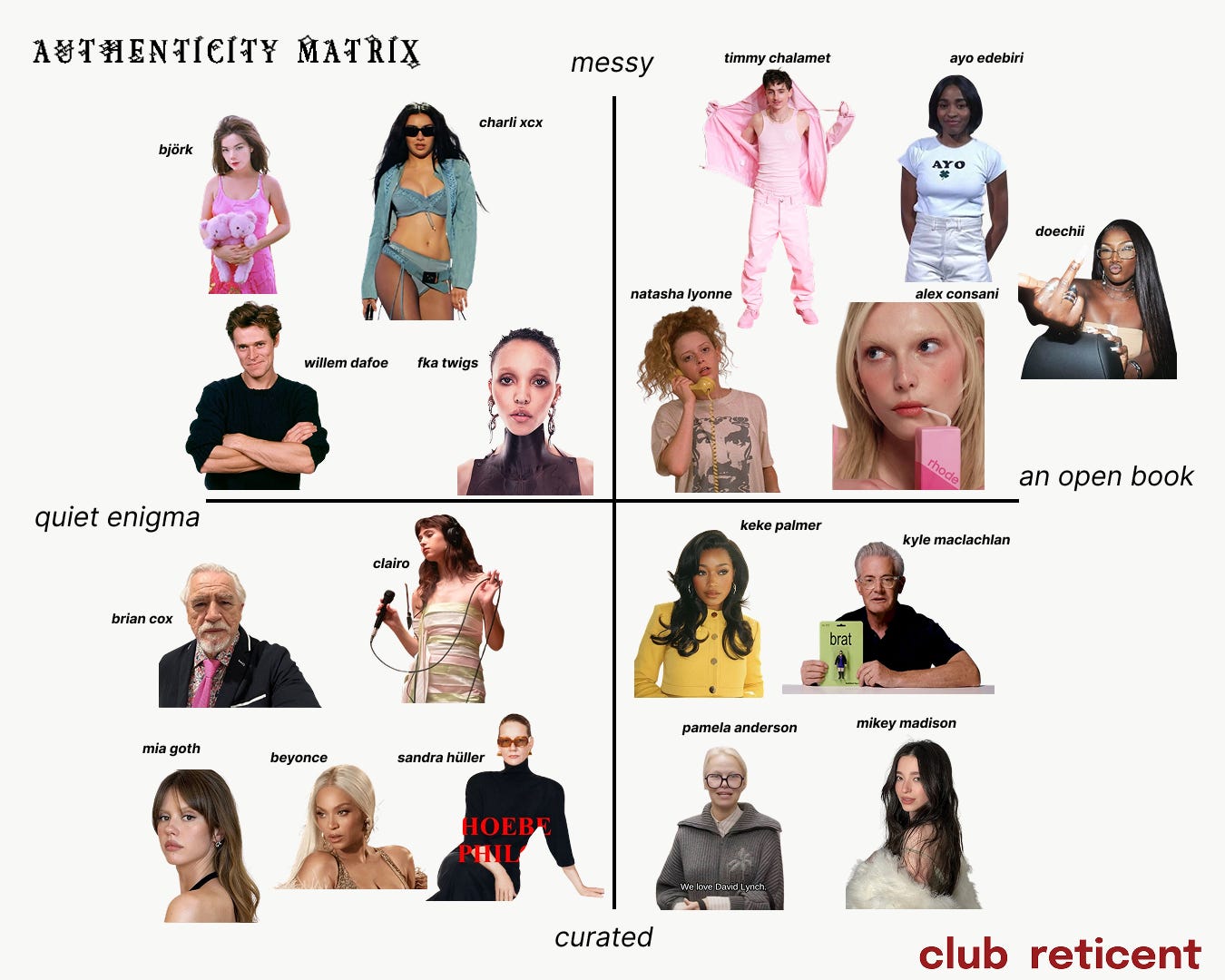“Show up authentically” is a brilliant idea you’ve heard many times before, but an incoherent, gear-grinding set of vowels and consonants to those of us who don’t know where our authenticity is. It’s not that we haven’t found it —that would imply authenticity is a foreign object to be picked up and recycled at one’s convenience— but that we’d buried it long before we knew we’d ever need it. Like any good faith instinct, authenticity is no second nature when draped in shame: it has to be excavated from the many layers of performative elegance. Covering up freckles, desires, or opinions, shame ricochets in different ways — there is, of course, that hollow footstep sound everywhere you go when you’re not entirely you. And who can blame you for holding back?
The risky, unfiltered joke you haven’t fully thought out, the undignified morning stretch upon waking up before you regain full alertness and remember you have somebody new sleeping next to you, or the vino flush escaping through whispered confessions — all of these are momentary glimpses of authenticity. For the ashamed ones, they’re anything but endearing; more of a jumpscare that reveals itself with vehemence when we forget we’re supposed to be performing. An intermission of sorts, breaking the untenable fourth wall. I’ve been performing my whole life to escape accountability, so when I’m told to be myself, which one of me should I attempt to be today? There’s at least a thousand of ‘em, all of which I could line up and assort alphabetically or by price. To assume the only authentic thing about me is precisely my urge to perform is not such a farfetched thought, but a really uncomfortable one. Jaques claims that all the world’s a stage, but William forgot to consider how easy it is to get stranded somewhere between the script and the spotlight.
I spent this past week thinking about Doechii’s incredible career trajectory from the iconic “I got fired thank God” video to a successful album rollout to, most recently, winning a Grammy. First, she was so real for that. Second, I couldn’t imagine being this open and candid about the unglamorous curveballs of life. Keeping pitfalls to yourself, dragging them by teeth back to bed like a dog would its chewed up toy, isn’t that how we were taught to deal with failure? That’s all I’ve known, at least. Is my continuous need for privacy a character trait, or am I just… always ashamed?
In the first part of the essay, we uncovered that your charm lay in offering others unconditional honesty and vulnerability, making them more comfortable in their own skin by holding up a mirror to their glow — to show up as you are, fully and earnestly, take it or leave it. Doing so requires a level of authenticity from you, but what if you’ve never known it? I understand how an abstract framework offered in place of actionable advice is just #cope — like something from the pestering self-help books I roll my eyes at. “Being you is perfectly enough!” doesn’t satisfy the ear when your go-to strategy is body-checking or falling at the mercy of other people’s free will. I know, I know. Trying to be yourself is a full-time job when it’s not your natural state. It’s damn exhausting.
Shame follows me around like a thick layer of smog, so dense I could butter a piece of toast with it. Brené Brown’s definition resonates the best: “the intensely painful feeling or experience of believing we are flawed and therefore unworthy of acceptance and belonging.” It’s a self-blame tactic that visits so frequently you may as well allocate a guest room for it. One of my earliest memories of shame is bringing a birthday gift I’d convinced my mom to wrap the night before for my kindergarten crush only for him to open it in front of everybody, my bespoke gesture becoming the butt of the joke for the following weeks. I didn’t think the kids or the Love Of My Life were cruel — I thought there was something wrong with me or my affection. Fast forward to now, I’ve learned my lesson —I don’t buy men presents until they profess their undying, torturous love to me— but the same old shit shows up in grown up ways.
I’ve tamed my insecurities enough to not let them seep through my flesh everywhere I go, but that doesn’t mean I’ve won the battle. Most recently, I didn’t get into the grad school program I wanted — and told nobody1. It felt comforting, in a way, to get a confirmation in writing that there’s something fundamentally wrong, unintelligent, and rotten about me — because, of course, referring to the 3-5% acceptance rate or extending empathy to myself would be a bore. Who needs statistics when you’ve got self-vitriol? But, as I said, claiming “lucky girl syndrome” curled up on the bathroom floor when luck gets abstract is just revenge porn on yourself. Adult shame is a slow burn, a feeling equally nagging and neurotic, as though I don’t deserve to be in places I find myself in, that I’ve gotten up to this point by some hasty error and will be escorted out of the room at any moment. I feel it at social events, I feel it naked, when I stutter on the phone, when I’m expressing an unusual thought or struggling to order coffee in a new language. This, of course, creates more isolation, further separating me from others, creating more shame, and off on a vicious bad trip we go. “The worst thing about shame is that we imagine we are the only ones to experience it,” Annie Ernaux wrote in the brilliant eponymous Shame.
And how are we supposed to be open to the world when we’re ashamed in perpetuity? It’s an impenetrable barrier that puts you behind a glass wall, dividing what is and what could be. We then resort to the only two available options: incessant people-pleasing or a full clam shell retreat. And when those don’t work, we try harder, isolating even further along the edges. Like a violin string stretched to its very limits, performative charm is never charming — it’s alarming, if anything, operating on a certain desperation to be liked, as though your entire world will crumble any minute. “We flatter ourselves by thinking this compulsion to please others is an attractive trait: a gist for imaginative empathy, evidence of our willingness to give,” Didion wrote in On Self-Respect, debunking the fragile thinking that being of service to others means being more liked. It is, indeed, a compulsion — nothing more, nothing less. Frozen in shame, despair constricts and expands with you as you go; an abrasive, hollow state that doesn’t let pure and honest connection form.
To locate authenticity is to look shame dead in the eye first, which is a bone-chilling, lonely process. Where does it hurt to be you? You may not want the answer. I certainly don’t. But I know that my relentless willingness to face the worst of hardships yet a total embargo on looking within is hypocritical at best, especially when I’m telling you to be yourself in order to be charming. If we have all this ambitious endurance to rise and grind in the corporate world, to find love and lose it, all this tooth and nail fighting for opportunities, connections, and callbacks, certainly the same brute force can be applied to inner work. Is this where we start glueing our true selves back together? I pledge to try.
the authenticity matrix
I argued that not all charming people are created equal — I believe authenticity, too, comes in different shapes and sizes. Let me illustrate what I mean…
This matrix is obviously not rooted in research — it’s a vision that came to me in a dream, like the periodic table jolting Mendeleev awake. I, too, am a scientist of sorts, but pop culture is the only way I’m willing to engage with coordinates2. Some of you will say turning to celebrities for authenticity assessment is counterintuitive; their whole entourage is mostly good branding and a solid PR team. But the archetypes are as valid as any, and I’d like to believe one’s public persona is largely informed by their private self — at the very least, it has to feel organic and true to us, otherwise we wouldn’t be so charmed and enthralled. Plus, they’re people, too — I’m always reminded of this JLo escapade.
The x-axis is about privacy or openness. It runs from quiet enigma to open book — a spectrum of how much or how little of yourself you’re willing to share. How much do you let people know about you? Do you feel easily understood? Does your presence alone invite interpretation? Are you more likely to withdraw? The difference between an enigma and an open book is one refuses to address their plastic surgery allegations, while the other is already forwarding you their surgeon’s number.







